Recently, I travelled to China for the first time in my life. This country has been on my bucket list for quite some while already, and the tipping point for deciding to finally go see it was when a climbing buddy told me that he planned going there. So, why not go now.
This blog post is part of a series I’m planning to write about my personal and subjective experience in the biggest country in the world, which amazed, surprised and sometimes frustrated me.
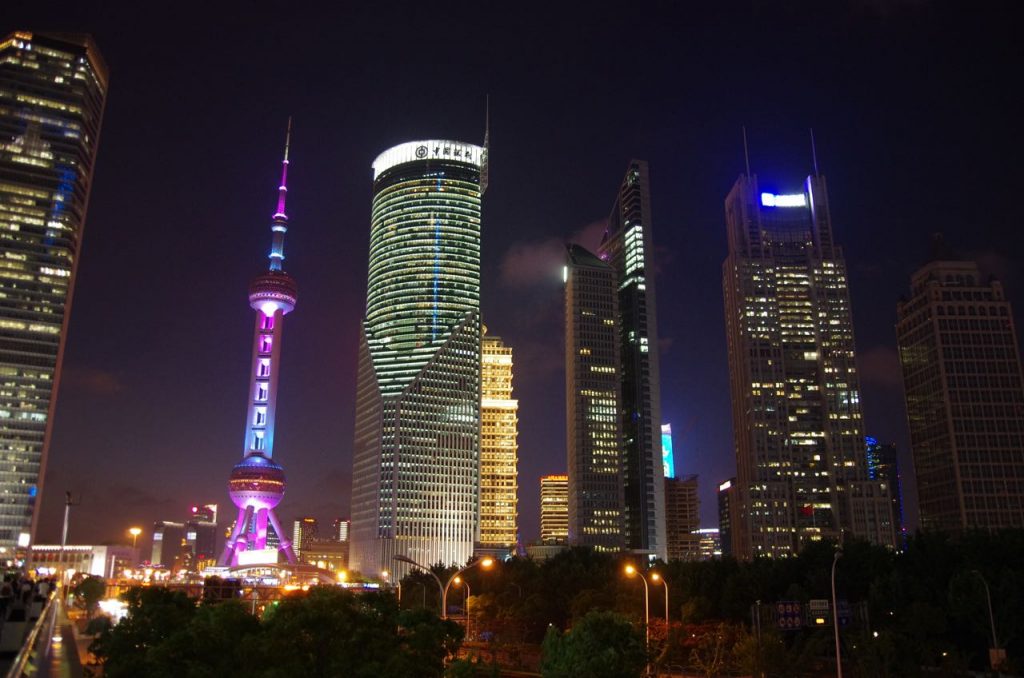
China is the global number 4 in surface area, which is huuuuuge compared to any of the European countries, in fact to all Europe. On thetruesize.com, you can check countries in comparison, which is kind of fun as we are all used to the „normal“ map image of the world which distorts the true dimensions due to the limitations of a two-dimensional image. So this is how China measures when projected on Europe:
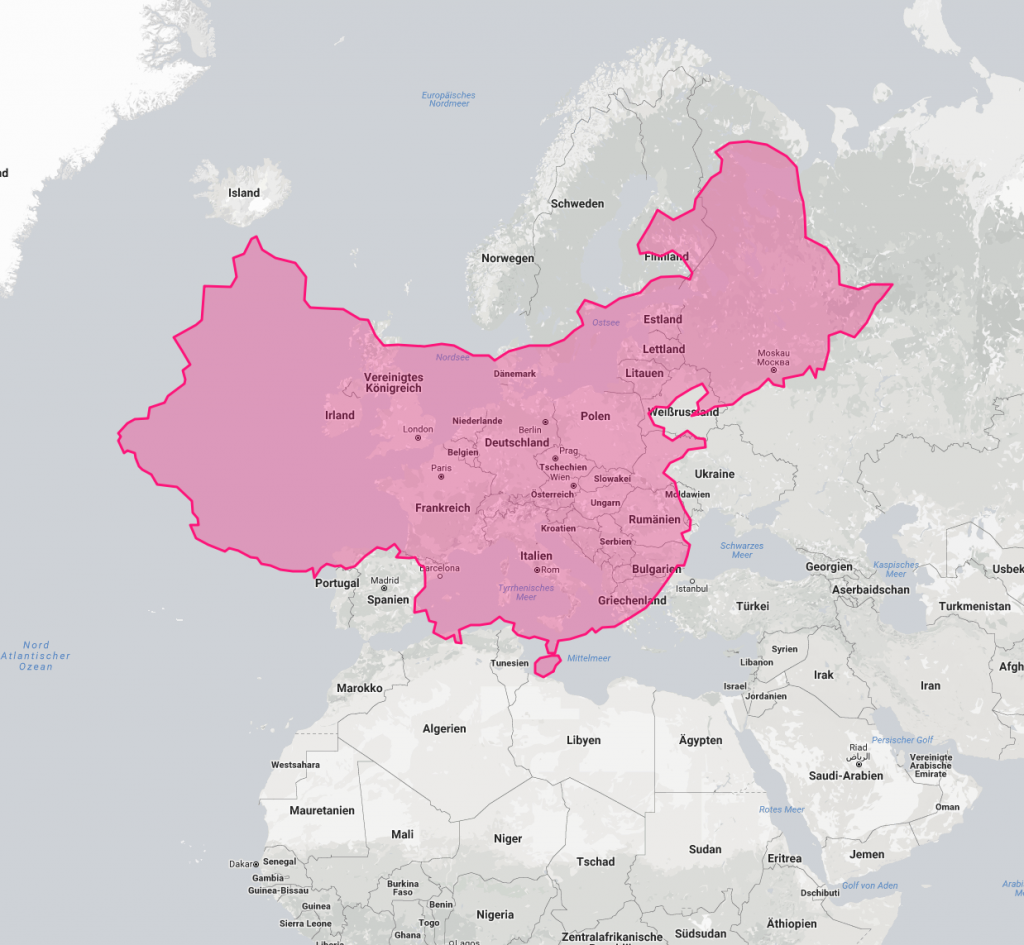
<Source: truesize.com>
That China clearly is the global number 1 in population is a fact you don’t need any statistics to understand. It is sufficient to go on a hike, maybe on a public holiday if you are especially wise, and you’ll be in a traffic jam on a staircase through the mountains, together with 1.35 billion fellow Chinese hikers. We’ll come to that later.
But now, let’s concentrate on COMMUNICATION.
Going to China is a time warp back to illiteracy.
Can you still remember the time when you were unable to read and write? In China, you will most probably be reminded. I am so used to finding my way through the world using my English language skills, that I sometimes forget (or deny) that I am basically illiterate in probably most countries of this world. But still it surprised me to find myself totally unable to communicate to the locals, and in most places not even being able to make myself understood in any way. It reminded me of a trip to Mali which left me deeply frustrated about my inabilities to talk to people that I decided to learn French as a result. Question is whether my lifetime will be sufficient to also learn Chinese, because I’m of course not yet done with French. Chances are high that I will travel to Japan inbetween, collecting another experience of illiteracy and maybe change plans to then learn Japanese instead. It is a hard choice, and life is just too short.
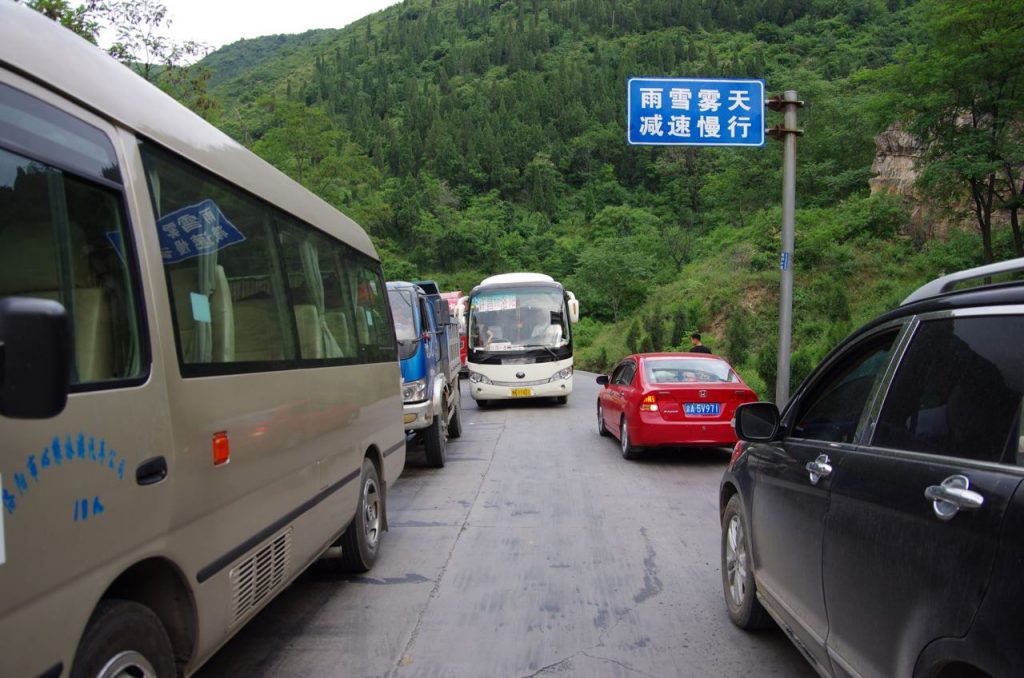
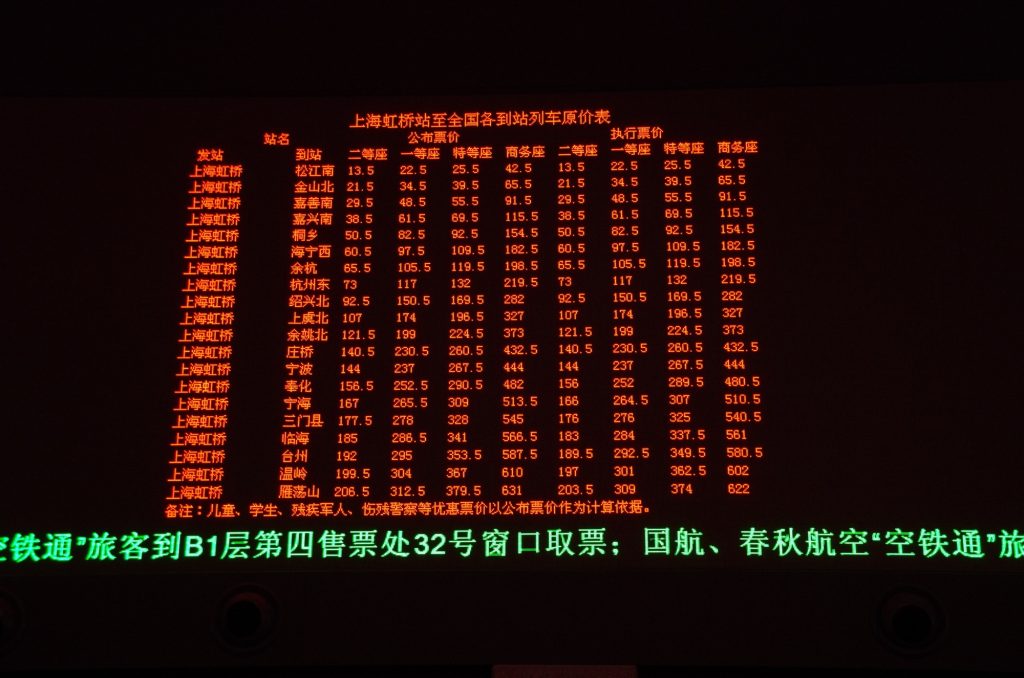
<Excuse the bad quality of this photograph – even if it was sharper, it would not contain any English.>
So, English helps everywhere, just not here.
You want to rely on your English? Well, maybe reconsider and train your arms and legs to proper sign language, as you probably won’t get very far. In big cities like Shanghai or Beijing, there is some English to be found, but other than there, you’ll be lost in translation. Don’t get me wrong, I consider this a failure of the traveller, not the country J
We tried several ways to get around with a little help from available options. The first one was to try to learn some basic words in Chinese.
Let’s start with „hello“ – should not be too hard, right?
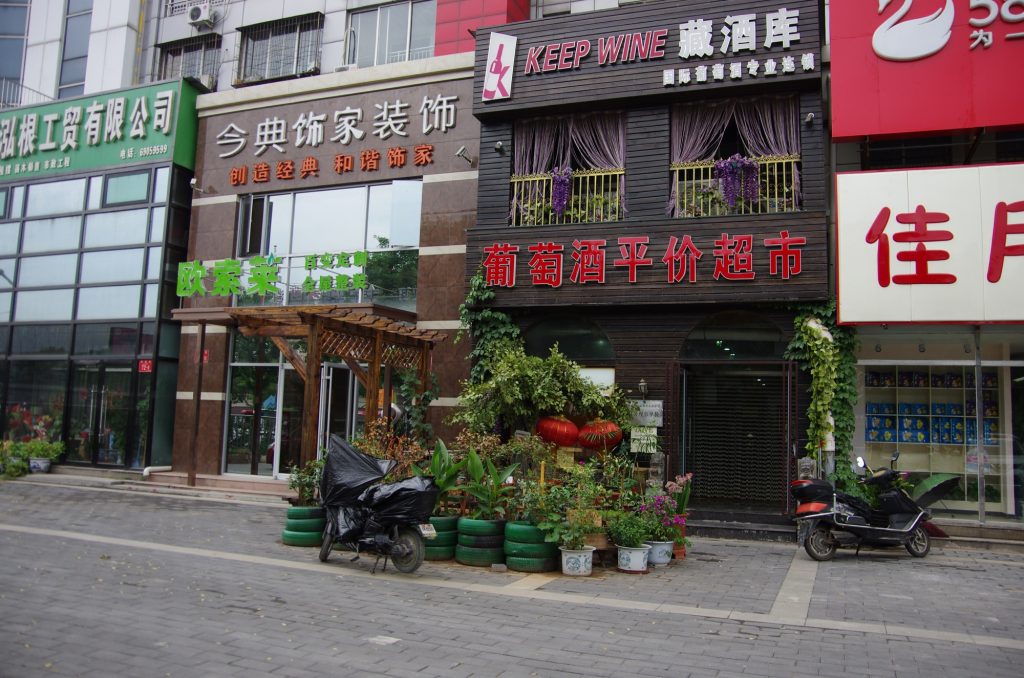
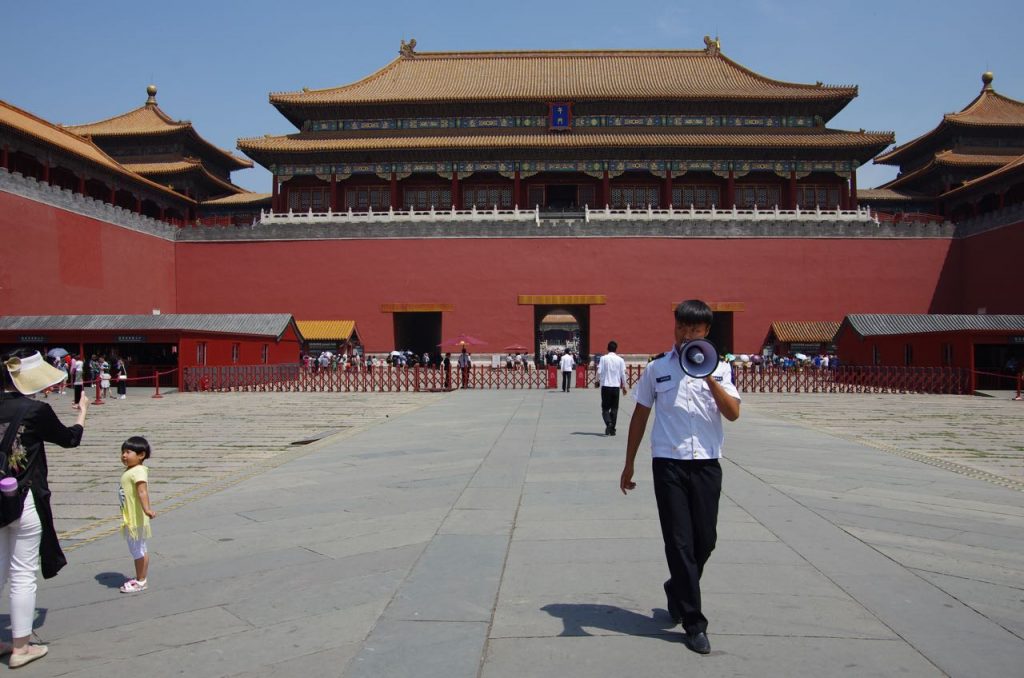
<If you are not understood, just speak louder – a very clever trick.>
You might think you said „hello“, but you obviously have said something very funny.
„Hello“ is easy in Chinese, just „ni-hao“. So, let’s be polite and enter the shop with a fresh and friendly „ni-hao!“. The shop keeper, who was smiling when you came through the door, now looks at you, puzzled. Then one of her eyebrows goes up, just slightly, and she blushes. Then, she looks at her colleague, and both start giggling.
But, wait… that is a very strange reaction… And then it dawns to you that you might (again!) have said something very funny, and you will never know what it was.
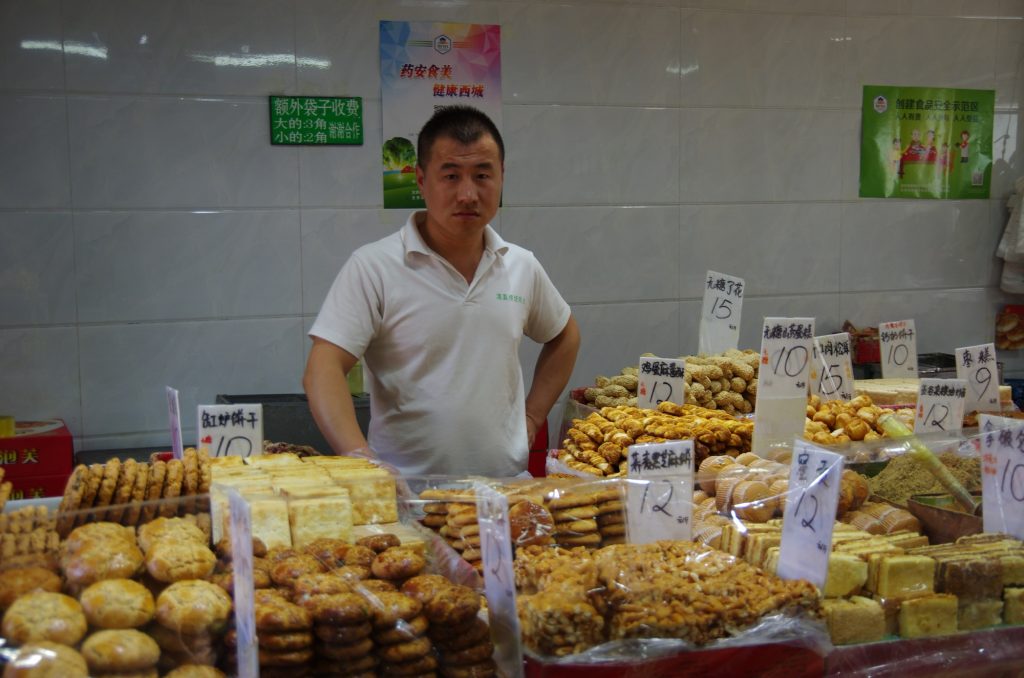
<I guess, in this case there was something offensive in my “hello”.>
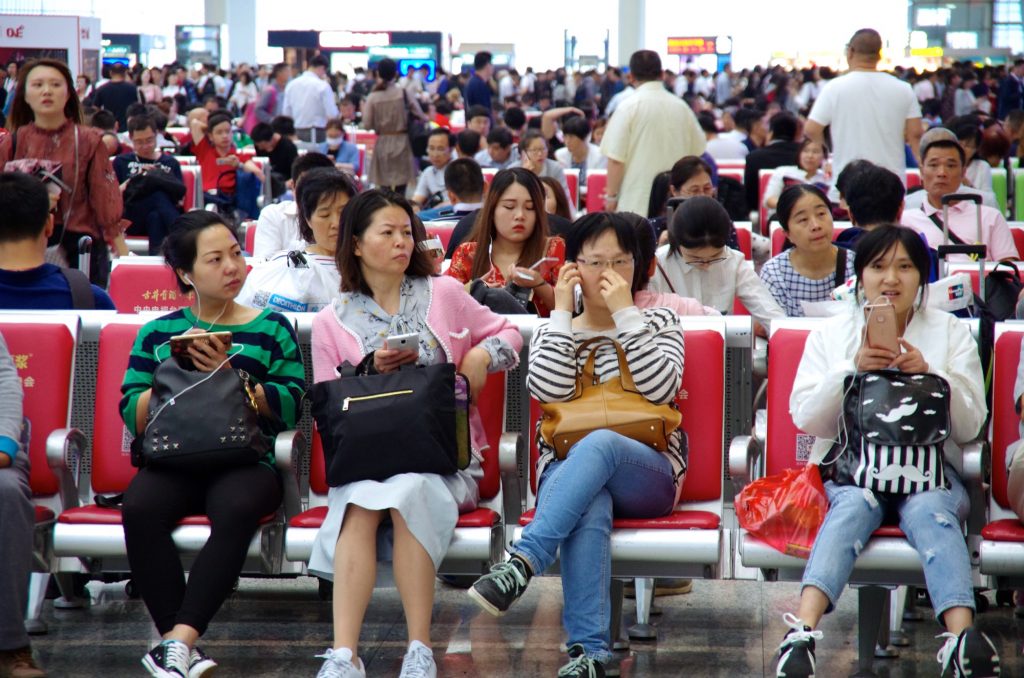
<Instead of the giggling shopkeepers, I took a photograph of the non-giggling commuters in Shanghai’s airport-like train station.>
Technology helps… quite.
So, let’s try other means now. One of our fellow travellers had an app installed which translates English to Chinese, not only in writing, but – that’s the trick – also reads the translation aloud in Chinese. The guy was a coffee addict, and due to the very hot whether, he wanted to have a little refreshment through an iced cappucchino. Yes, an iced cappuccino, that’s what he wanted. He got his phone out, started the app and typed in „iced cappucchino“. The voice read the translation and he waited with anticipation to get his drink. Which he finally did. Now it was his turn to be puzzled, because he got a blackberry ice cream shake, which was delicious, but seriously lacking caffeine.
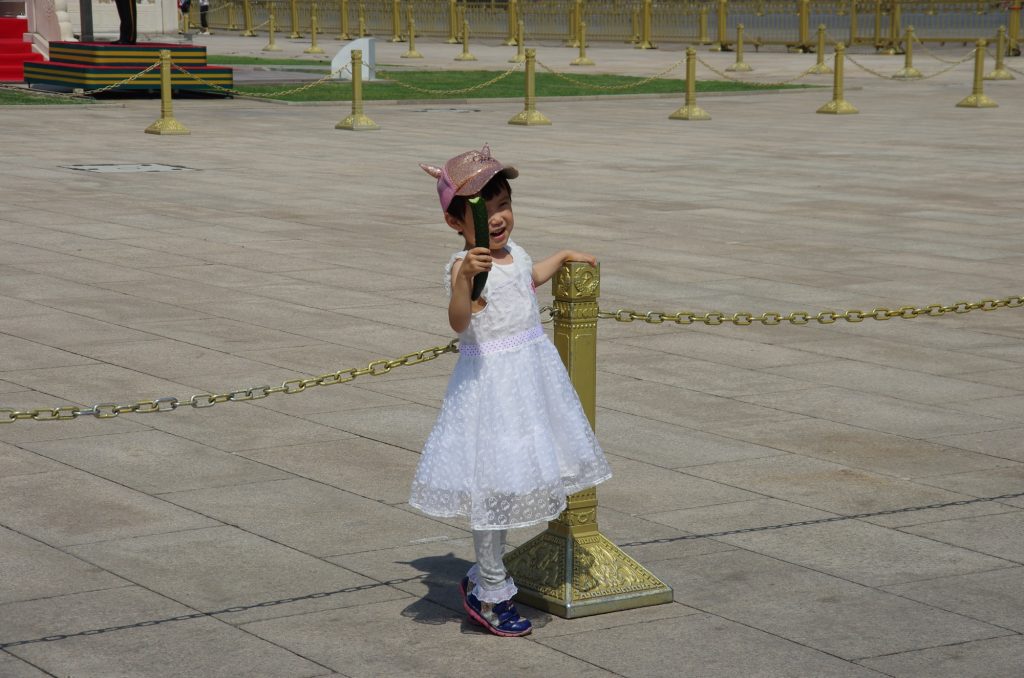
<As I have no photo of the blackberry ice cream shake, I took a photograph of a celebrated cucumber instead.>
But, what about signposts?
Yeeess, everything is signposted. Yes, yes. Everything. You’ll be safe.
So, now look at a signpost on the city wall of Pingyao, a wonderful ancient city in the Shanxi province, which is an UNESCO world heritage. You can walk around the city walls and peek into the courtyards of the wooden houses within, which is definite fun to do. And here we go – look at this sign, and you will very well know how you are supposed to behave:
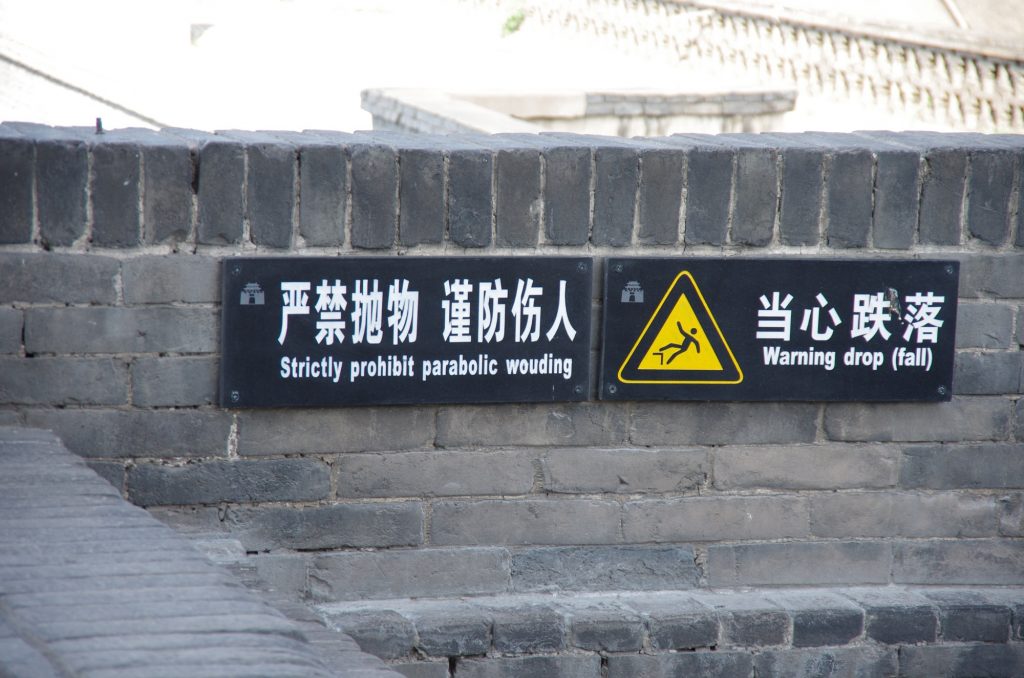
Parabolic wouding prohibited? OF COURSE I would never have thought of parabolic wouding, I would always have chosen hyperbolic wouding instead. Nope, no parabolic wouding, never. What the heck is parabollic wouding, anyway?
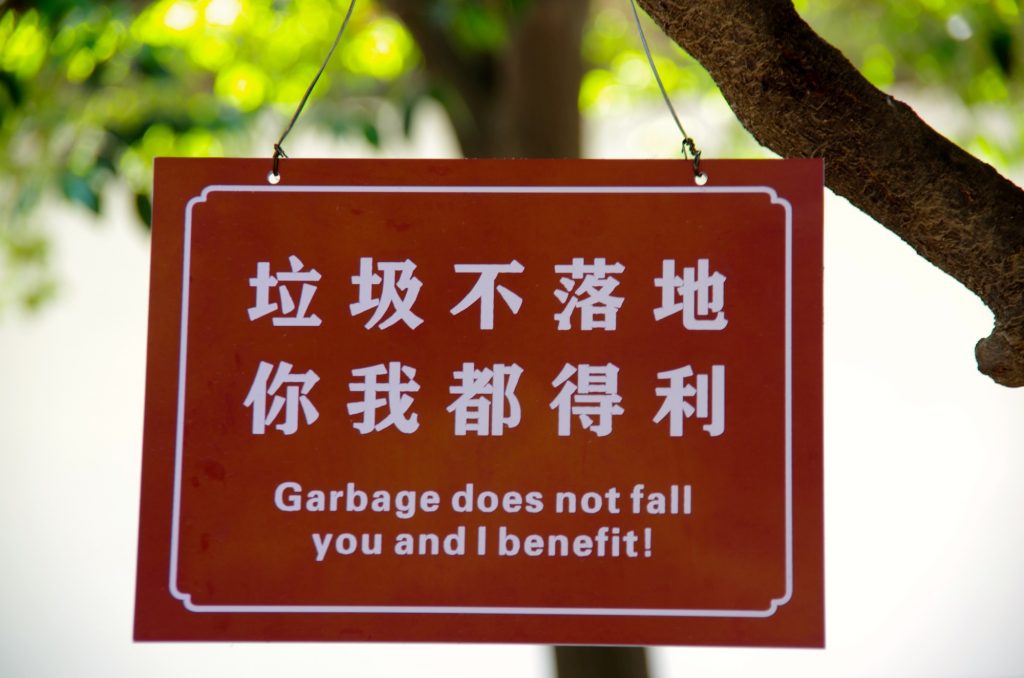
<This one I understand.>
Good old books help, yeah…!
Next challenge: going by taxi. We wanted to see the 798 art district in Beijing. Our guide scribbled the name of the place on a piece of paper, and off we went. It really is an interesting place. Going home was easy as well, just point to subway station close to the hotel and show the taxi driver. He started the engine and drove on. But now we had a problem, because he was a very friendly taxi driver who wanted to do some small talk. It took us some while to understand his question, but finally we got it: „England?“. Uh, hm, no, not England, really. We tried our best to respond „Germany“, but there was no sign of comprehension in his face. He tried again „England?“.
One fellow traveller got her old-fashioned book and pointed tovicv „I am German“ – which led to a beam of light going through the taxi driver’s face, and he excitedly exclaimed: „Ah, Germany! Football! Klinsmann! Völler!“
So, if you think Germany’s victory in 2014’s soccer world championship is of any importance to the world, think again. In Beijing, it’s rather the 1990’s that still counts.
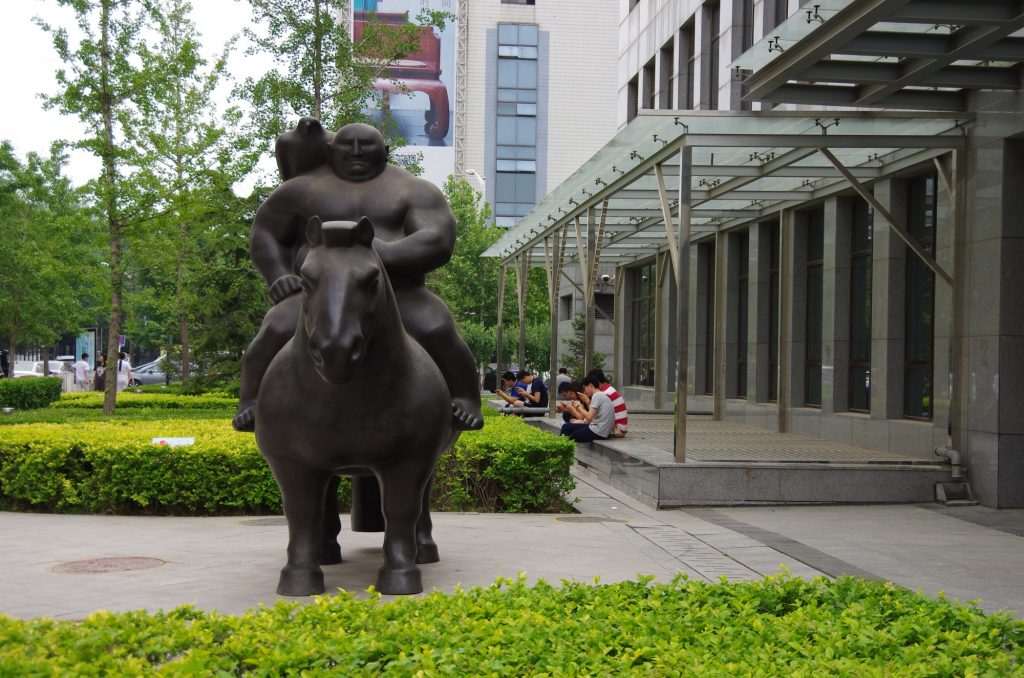
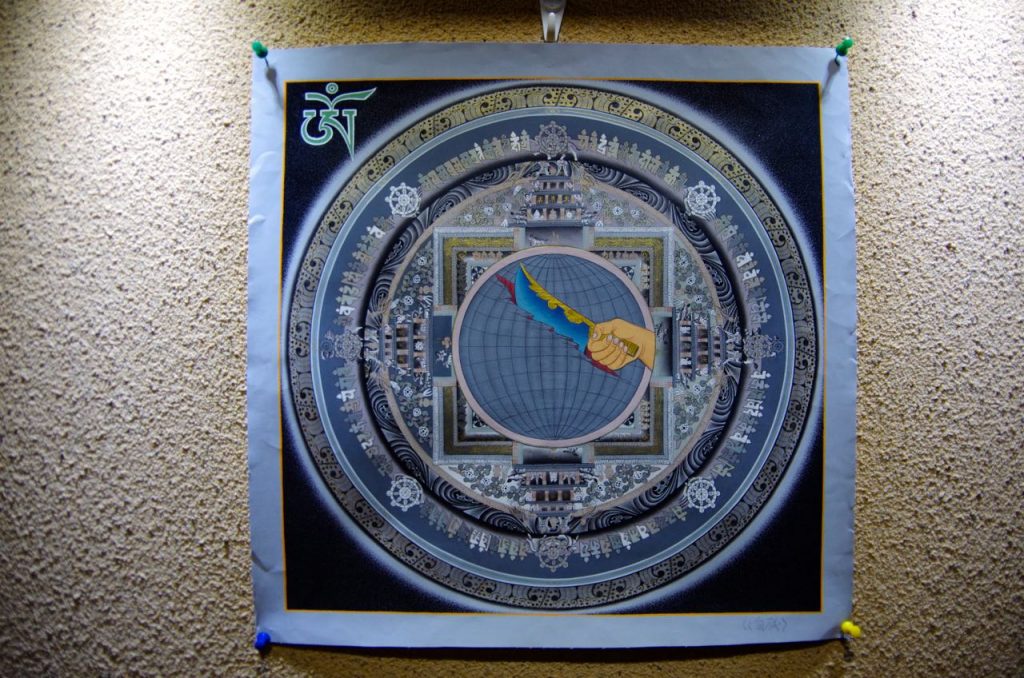
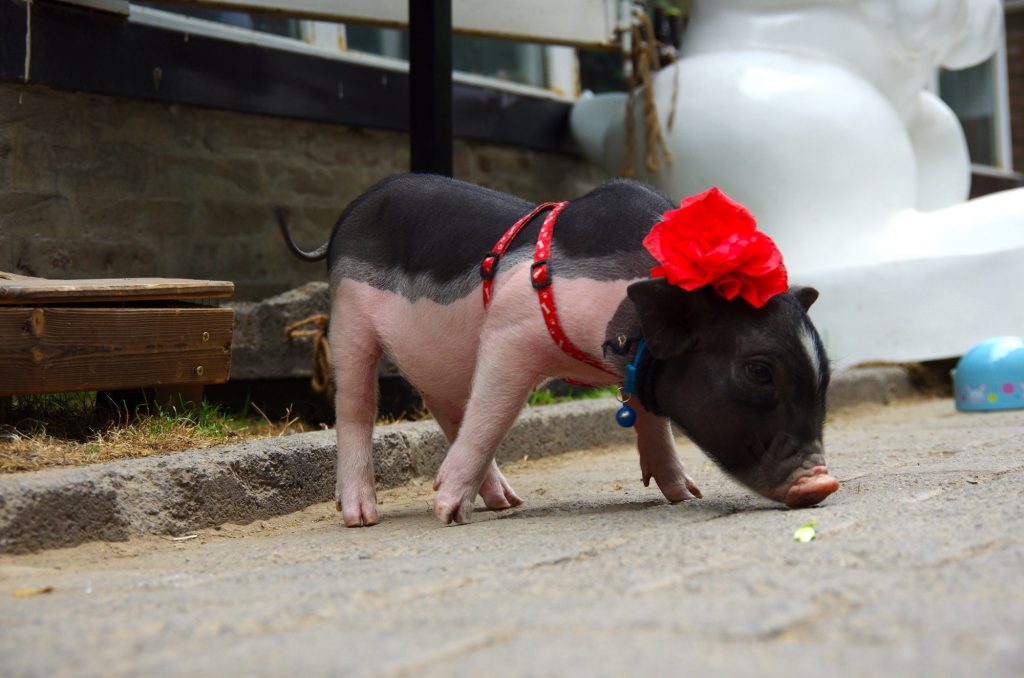

Aaaarrrrrggggghhhhh! This guy ate my dinosaur…!!!
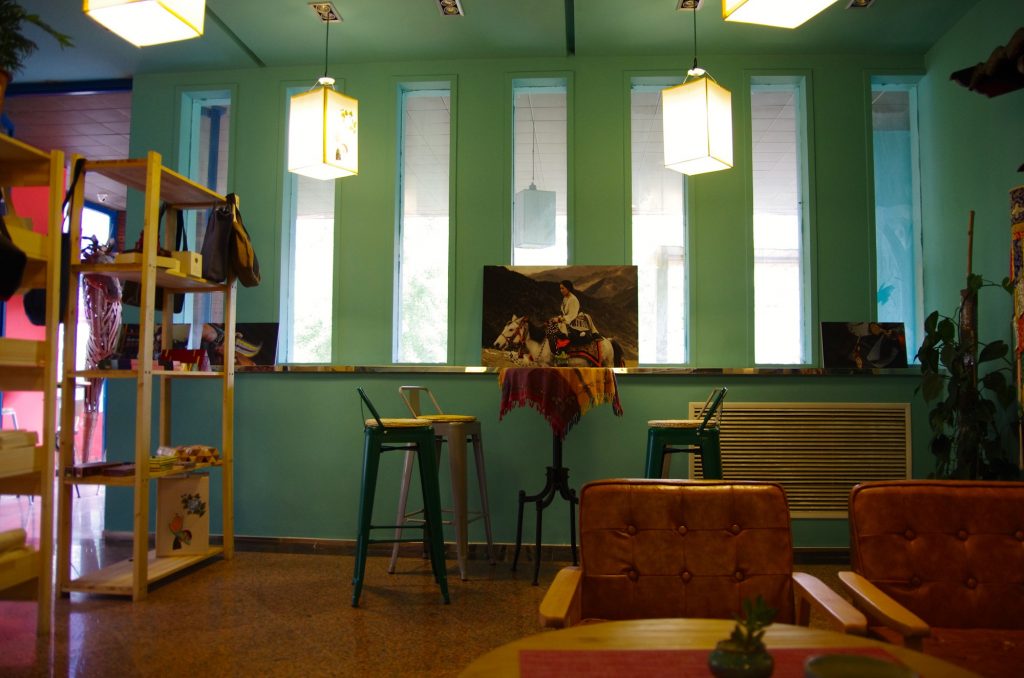
<In Beijing’s 798 Art district.>
If nothing else helps – just look for the symbols.
We saw many, many sacred and historical places along the way – temples, pagodas, ancient offices, emperors’ bedrooms, kitchens, schools, . And we got many explanations of the thousands of years of empire and religion deeply woven into the culture and soul of this impressive and amazing country. I must admit, over the course of our journey, the details got a little blurred (was it Qin? Or maybe it was Han? No, no, it was Jin, for sure, it must be Jin.), and impressions intermingled with each other. Call me ignorant, and I will say yes, maybe, but I really tried hard to keep all the facts in my memory. I was not 100% successful, though. But if someday somebody will ask for the meaning of X, and X is any of <dragon, pearl, blossom, tree, bat, lion, peanut, swirl-shaped window decoration, gold, the color red, the color yellow, silk stitching pattern, vase, seat, sword, feather, ornament>, then I can confidently say that the meaning of X is Y, where Y is any of <prosperity, happyness, long life>, or, in fact, a combination of two or all three. And it will be – in more than 99,9% of all cases – true.
Prosperity. Happyness. Long life. Yes, that’s it. A good summary of what most people want from life.
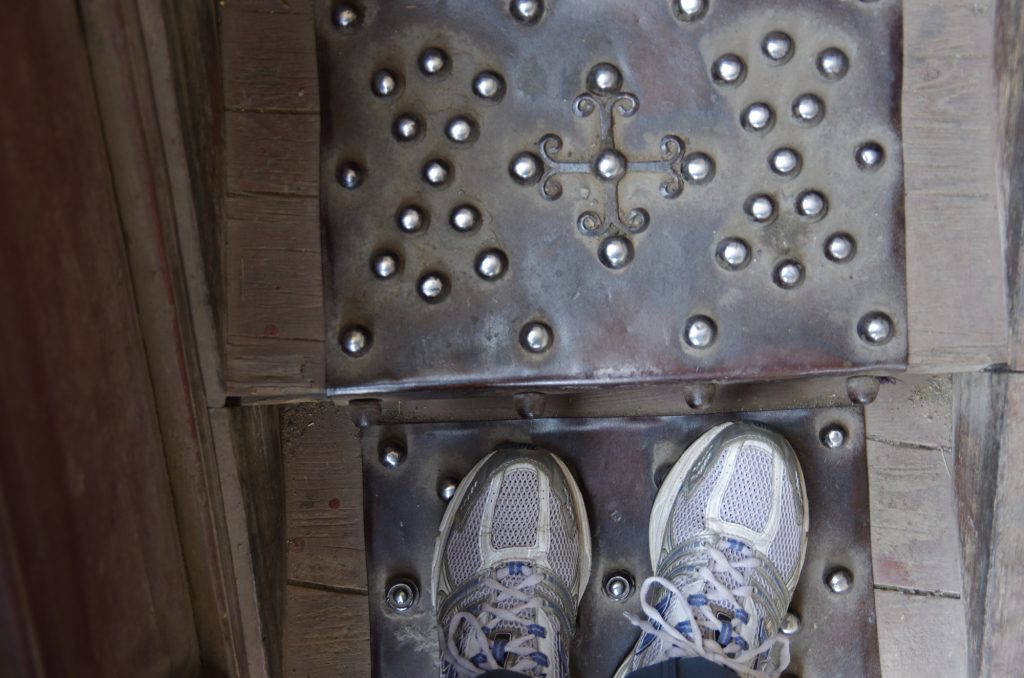
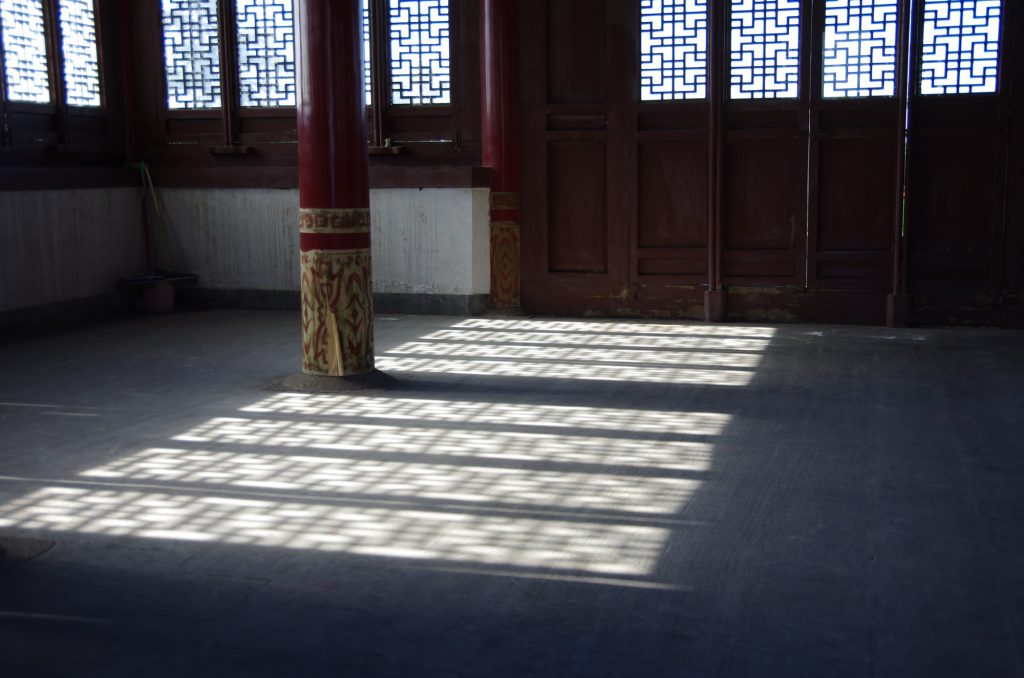
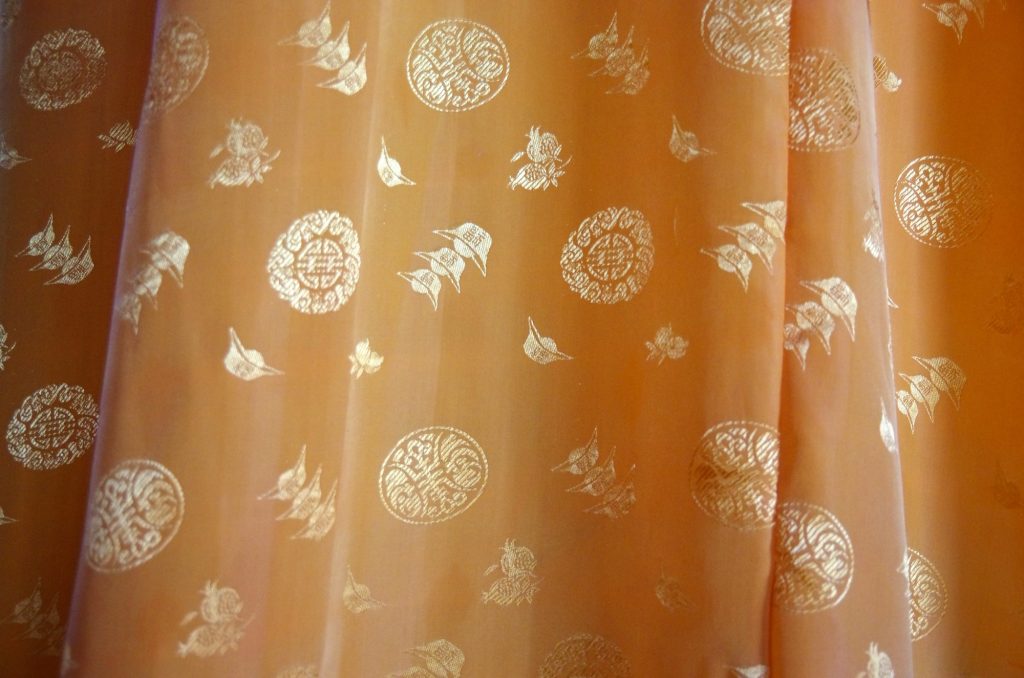
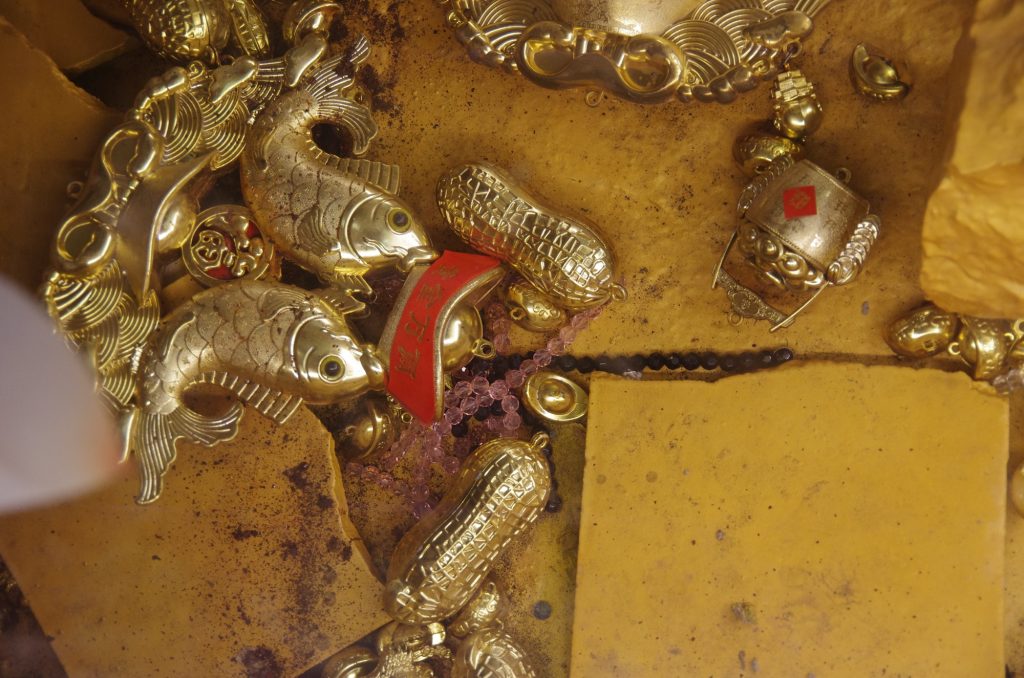
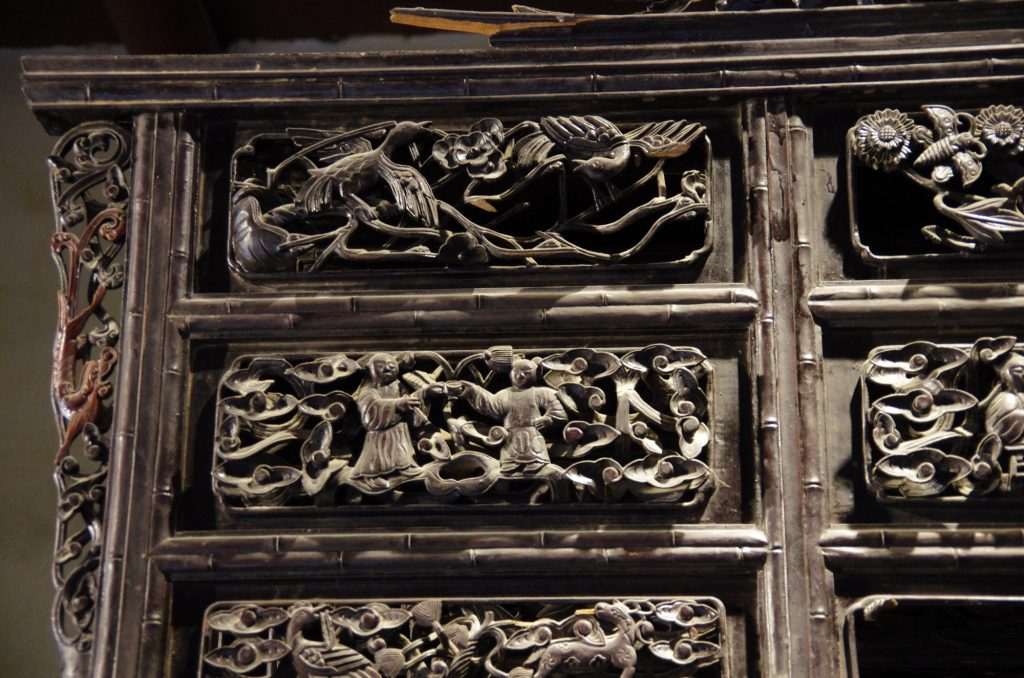
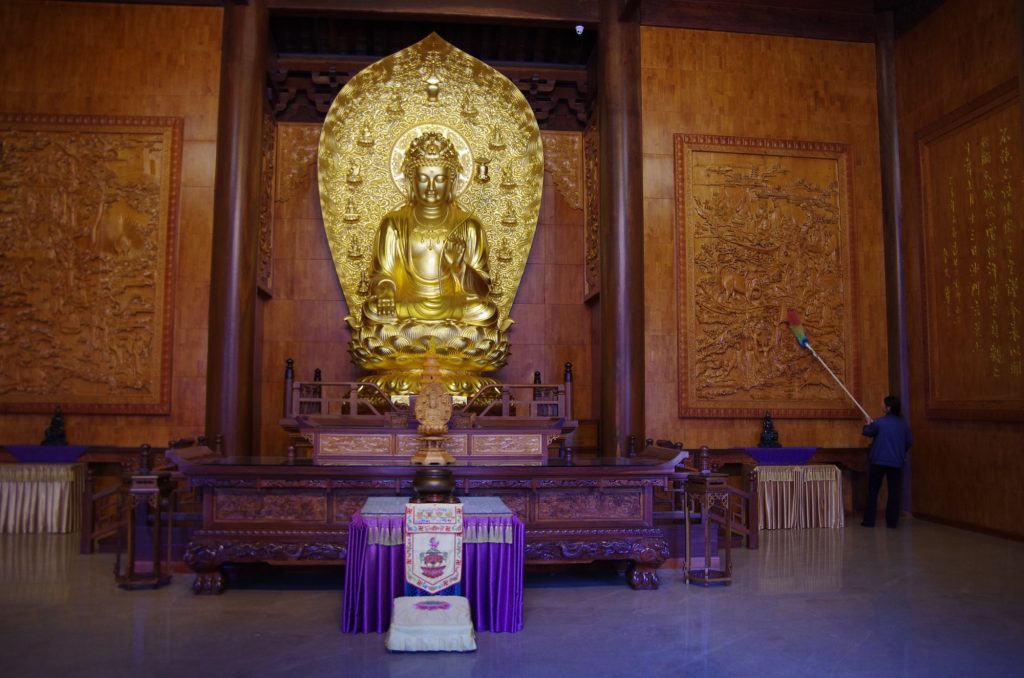
<Even the happiest Buddha needs some proper dusting once in a while.>
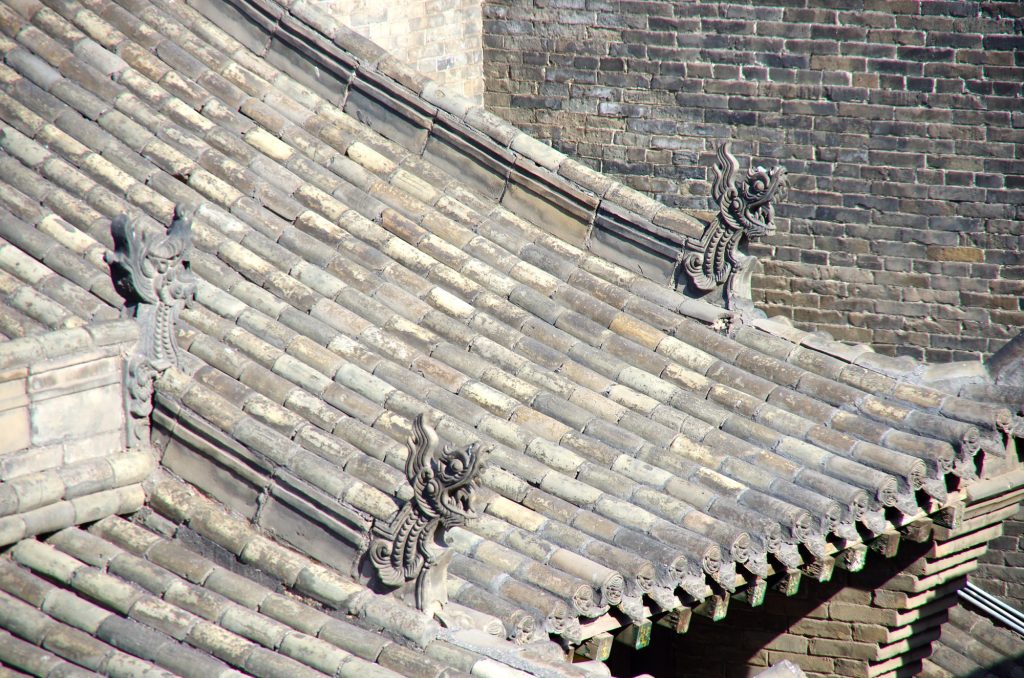
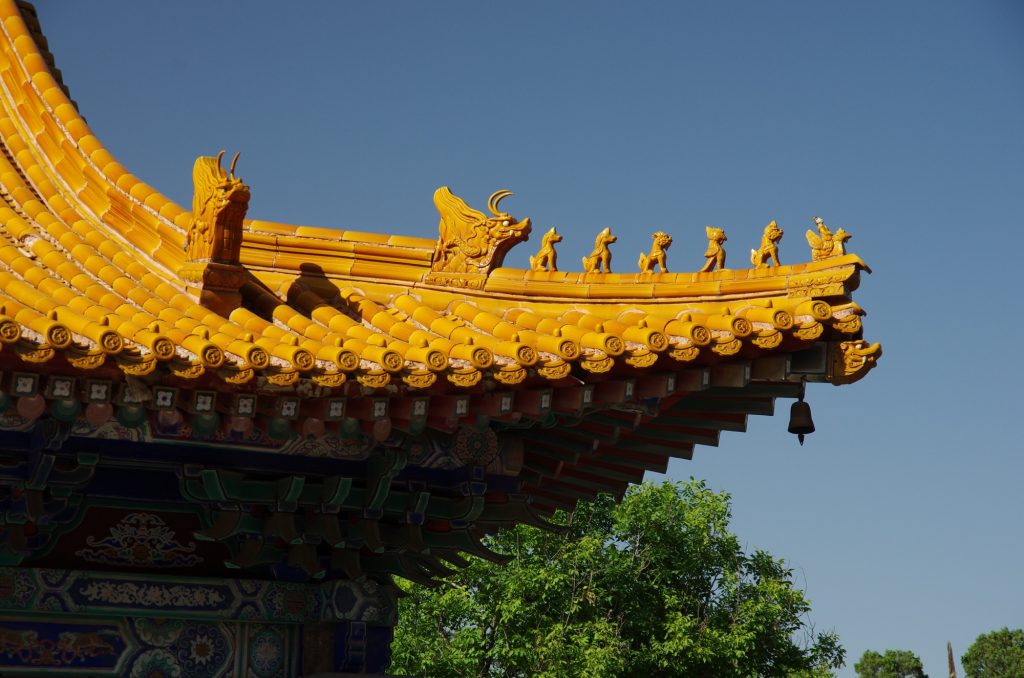
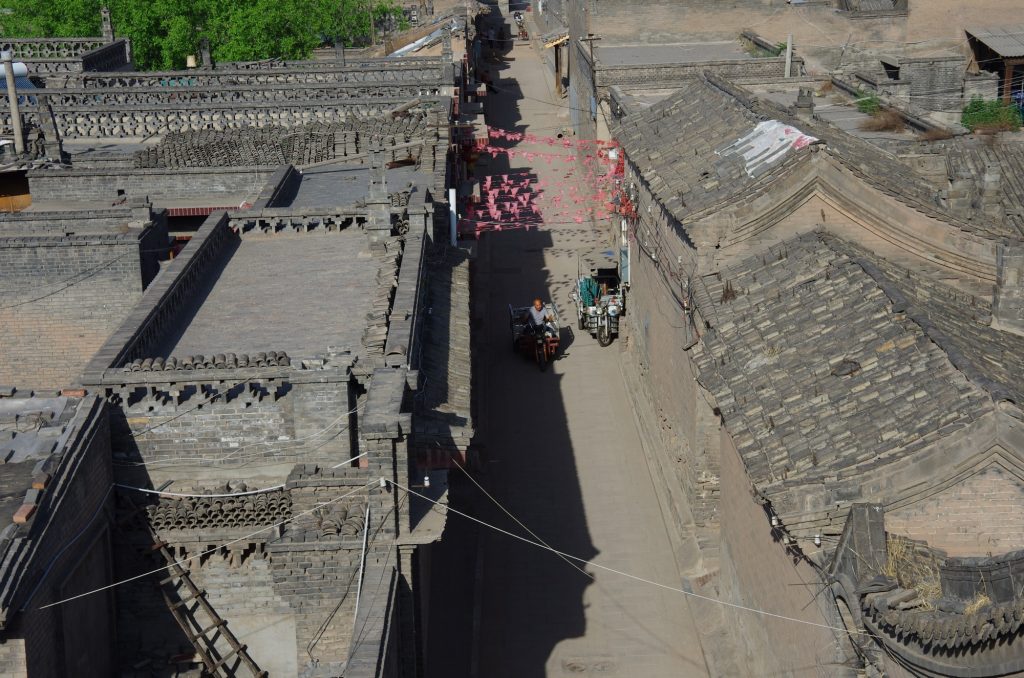
<There, do you see it? Prosperity, happiness and long life everywhere!>
Perfect food might still sound contageous.
Reading menues and food packages is great fun in China.
I am a cautious eater, and what I cannot identify normally won’t go into my mouth. Many things I can identify still won’t make it into my body, because I just don’t like them or don’t know whether I will like them and am too afraid to try. I know I’m missing out on amazing food opportunities, and I am working on it, but I’m not the omnivore I’d probably like to be yet. In China, we most times ate in a group and jointly ordered food to try for everyone, and I must say that most of the times I really, really loved the dishes. (Side note: The two exceptions should not be too dramatically presented here – but what the heck did my fellow travellers think when ordering lamb kidney skewers and duck intestines…???? But that’s another story.)
Luckily, most food packages and menus have pictures of the contents or the dish, so that it is normally no issue to find things you like. But then, you maybe should not pay too much attention to the English translations or otherwise you might be put off and refrain from buying „mixed bacteria“ or “fashion mirror” – while those are very delicious cookies or just some perfectly enjoyable steamed vegetables.
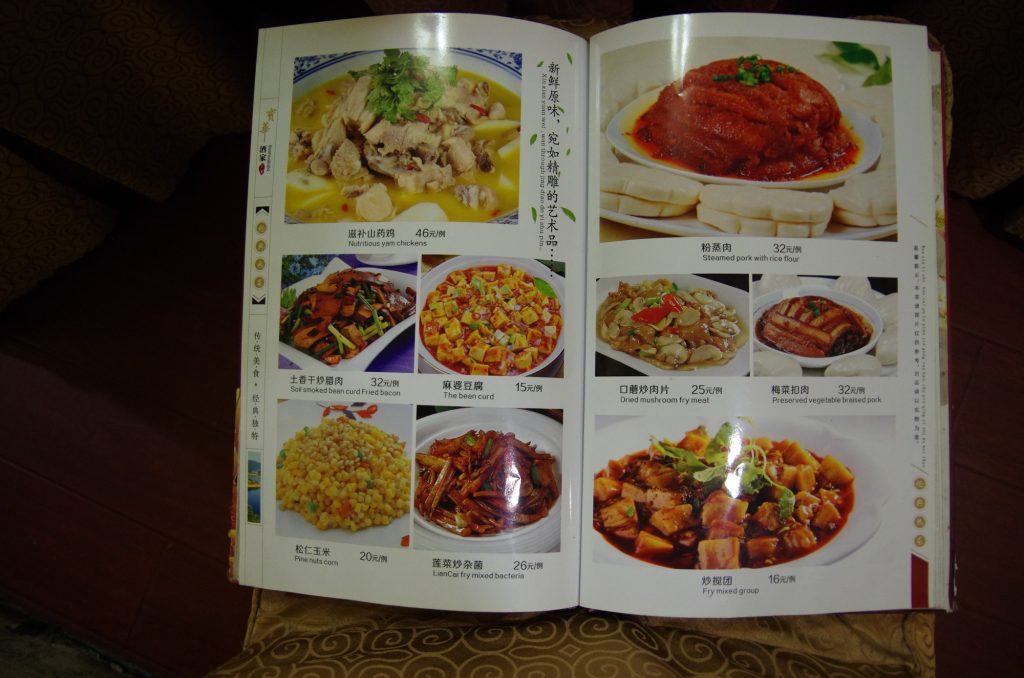
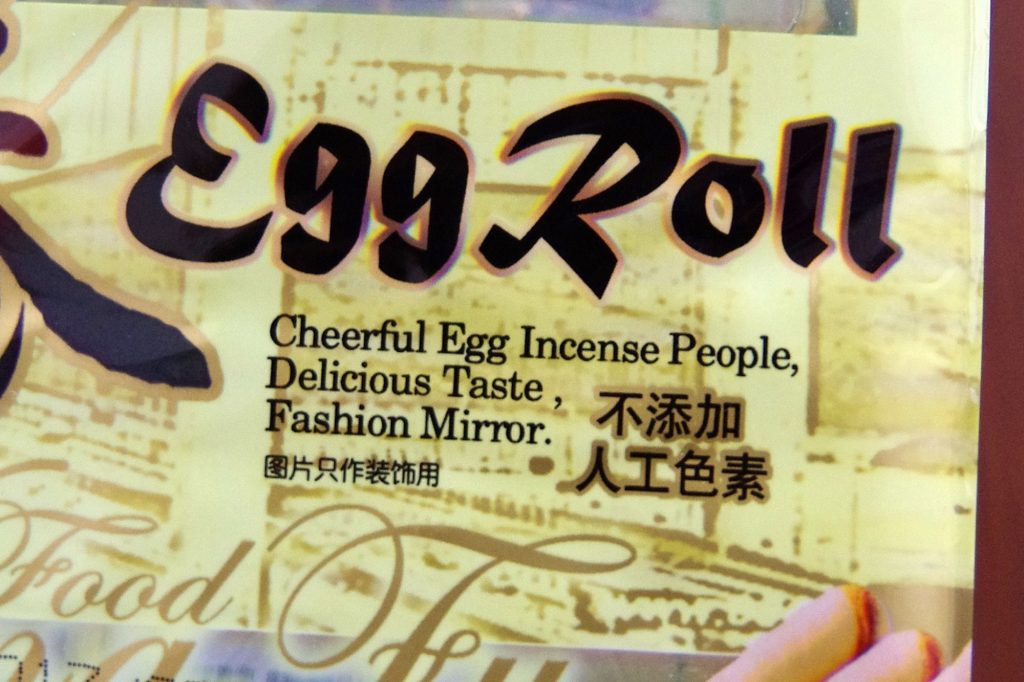
<Hmmmm, fashion mirror with mixed bacteria, yummy.>
Let’s try it with action, then.
My absolute favorite place in Beijing is Tian Tan Park, the park around the Temple of Heaven. It definitely is a center of communication as many people go there for just that: have company, chat, sit together to play or knit or do some dancing or gymnastics. This park is just the opposite of loneliness, the opposite of silence. There is a buzz from all the voices, and it still feels open and not crowded – this park is a breeze in between the heavy traffic and tourist-loaded sites you experience elsewhere in Beijing.
And here we go – some women play what I think is a mixture between a soft form of badminton and an elegant, flowing dance. The aim is not to beat each other, but to get into perfect harmony. One person flings a ball, not really a shuttlecock but rather a round object with a tail (actually resembling a sperm J) towards the other, who then catches it with her rack in a slow, flowing motion, maybe turning around to achieve a perfectly elegant movement, nearly like a ballerina, and then she immediately flings it back towards her partner for her to do the same or similar move. Both are in a joint swirl, with a slow and permanent rhythm, like a couple dancing a slow waltz. It’s amazing to watch.
My fellow traveller is invited to join, and the woman hands him her racket. He tries hard, but cannot get over his deeply embedded memory of playing badminton. So, “hitting” the ball, he utterly fails at the elegant part of this game. It is good fun, nonetheless.
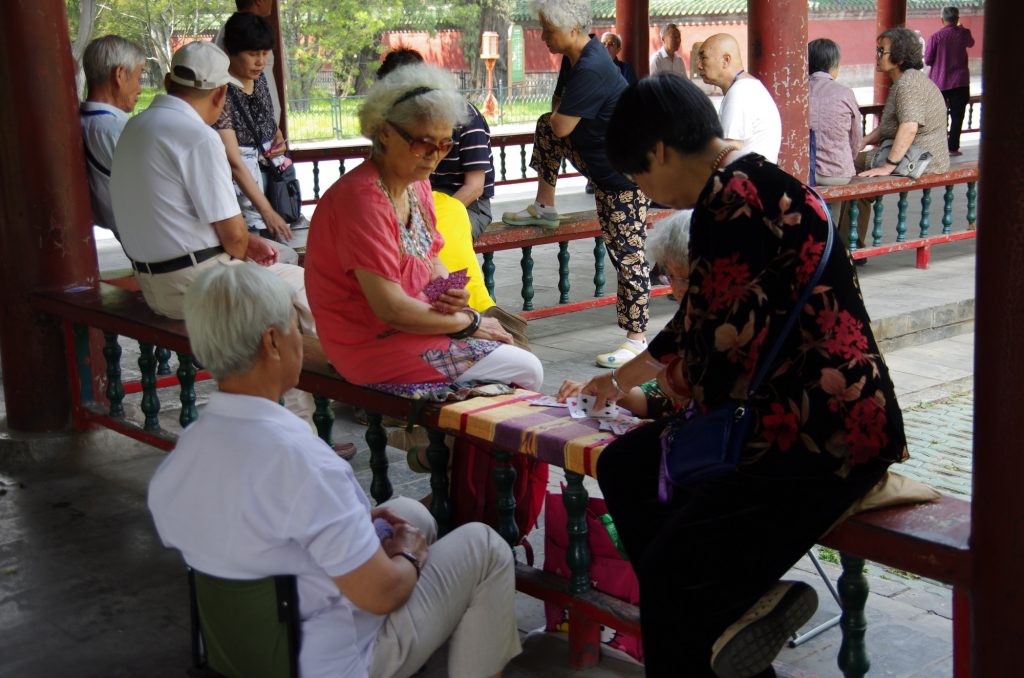
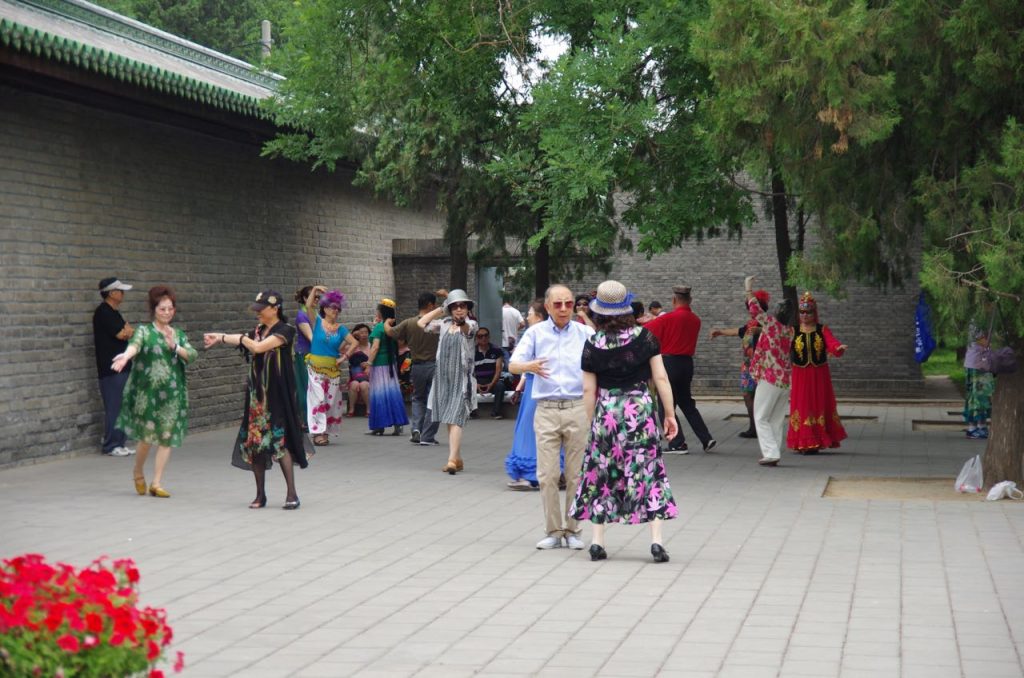
<In Tian Tan Park, Beijing’s most communicative place.>
Communication is everywhere and does not need people.
In China, I saw the funniest communication device I had come across in my entire life. We were hiking in the Wutai Shan mountains, a peaceful Buddhist place with barely no tourists (except us). After passing the entry gates, we were on our own, slowly making our way up the hill to see the temple at the top. Suddenly, I was startled as some voice spoke to me, coming out of the blue. I froze and really wondered where this voice came from – there it was again. I followed the sound in order to detect a solar powered praying blossom that was stuck into the grass and kept babbling sutras, sorry, proclaiming sutras. Questioning our guide I learned that this is a common accessory and you can choose the text and whether it should be a male or female voice helping you in your religious practice. Holy father, a solar powered prayer blossom (a durable plastic one) would be something that could probably bring Germany back to religious behaviors? I am sure those things could be programmed to read from the Old Testament in the Pope’s voice.
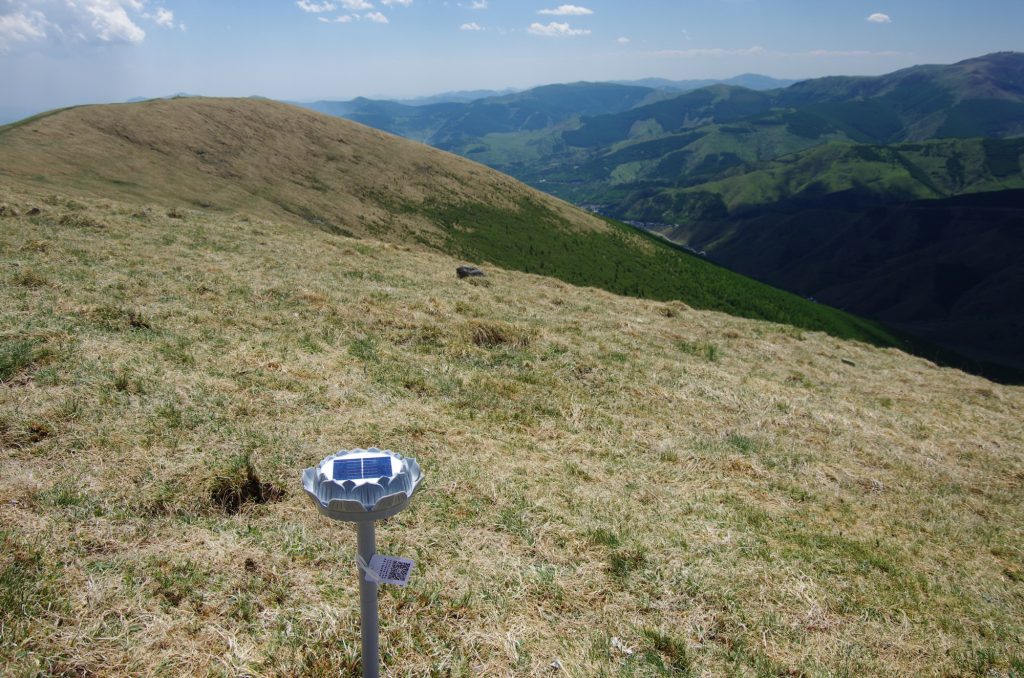
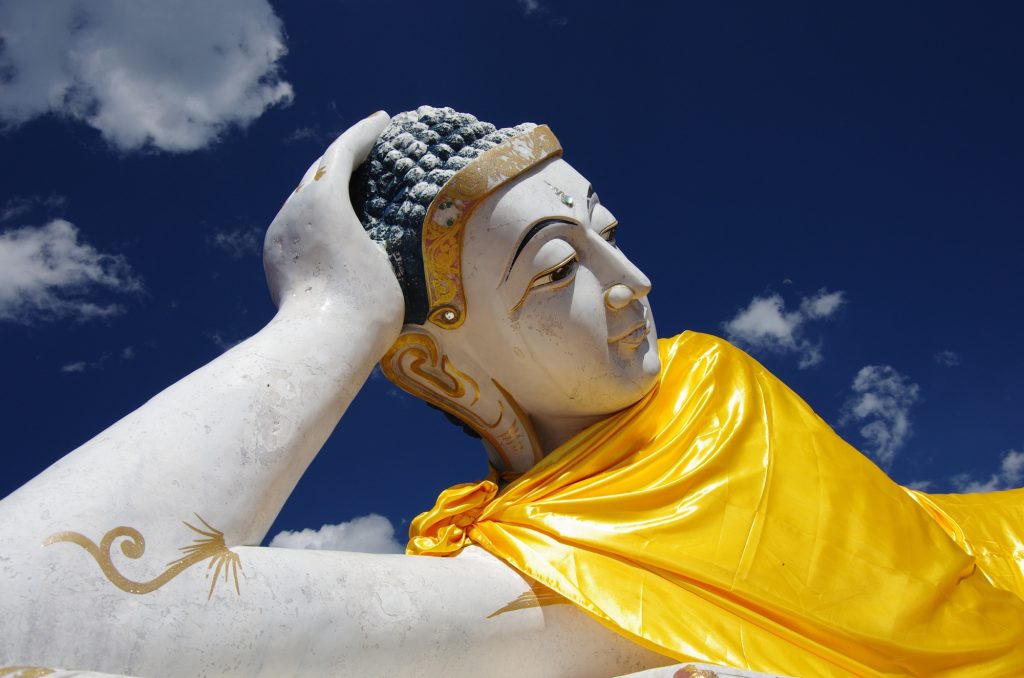
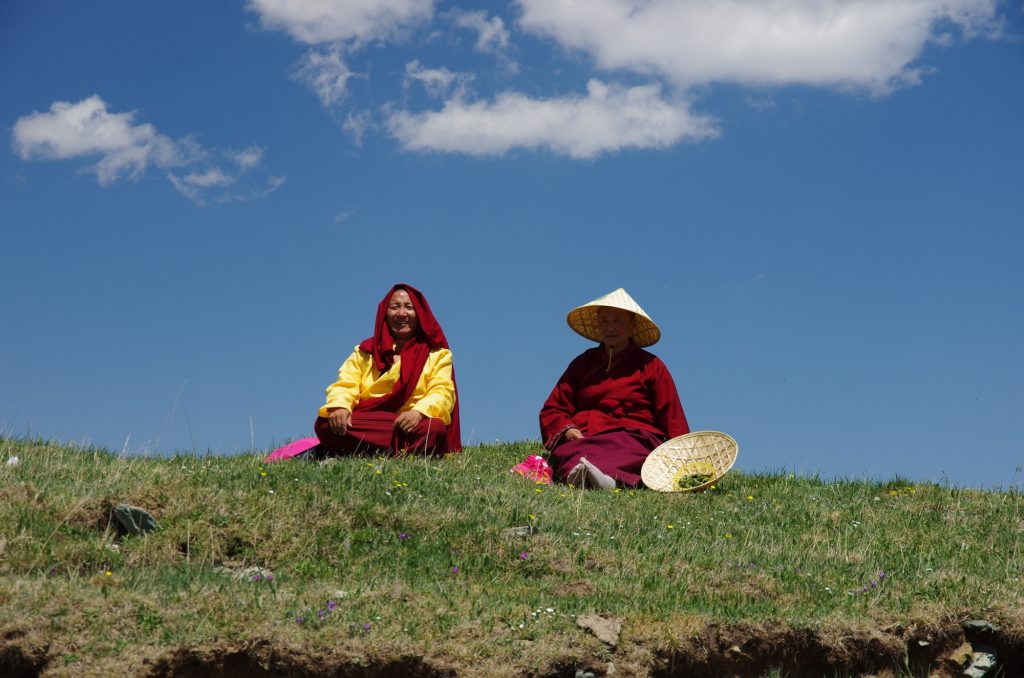
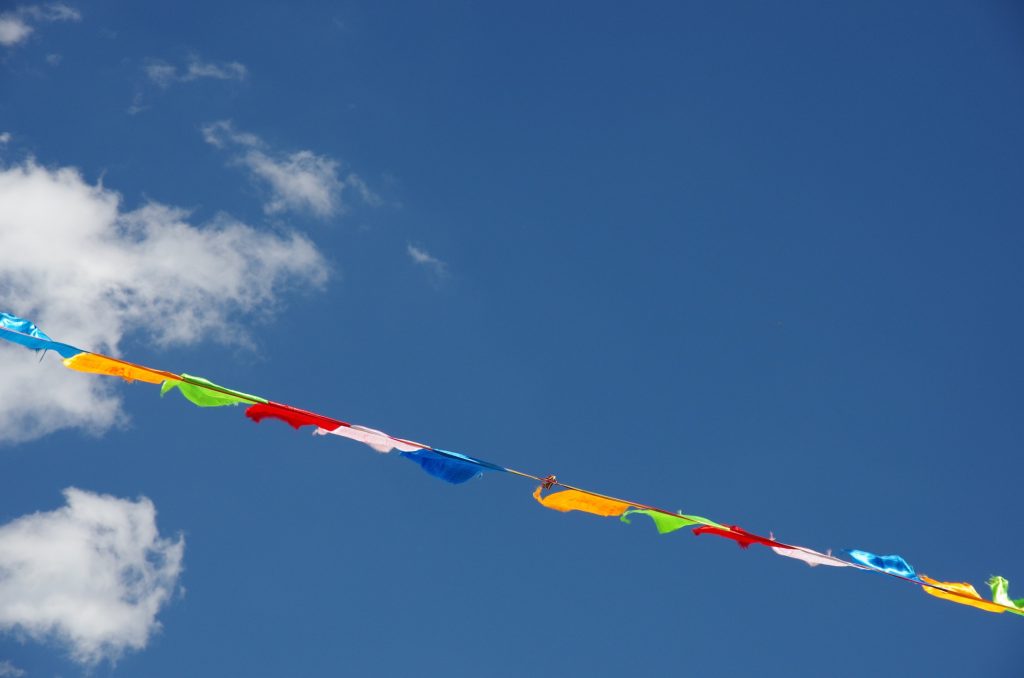
<Side note: I could not find any solar powered praying blossom to take home as a souvenir, unfortunately.>
Your name is not your name.
We did a fun exercise one day – we took a little course in calligraphy. Done skillfully, this clearly is an art; not only due to the complicated Chinese characters, but also due to the way you need to hold the brush, the challenge of slow-motioned yet determined strokes with well-dosed pressure. A nice lady explained to us how to do it and taught us a very important Chinese character in the process:
HAPPYNESS.
So off we went, scribbling away with black ink.
I asked the woman to write my name onto the blackboard, then asked our guide to translate back what she had written. He did – and it read “Le-Gi-Na”. Well, my name is Regine, so I asked whether there is any way to get closer to it. Unfortunately not, he replied. I was not very happy to having been renamed, but I don’t blame the calligraphy teacher for the incompatibilities between Chinese writing and German names.
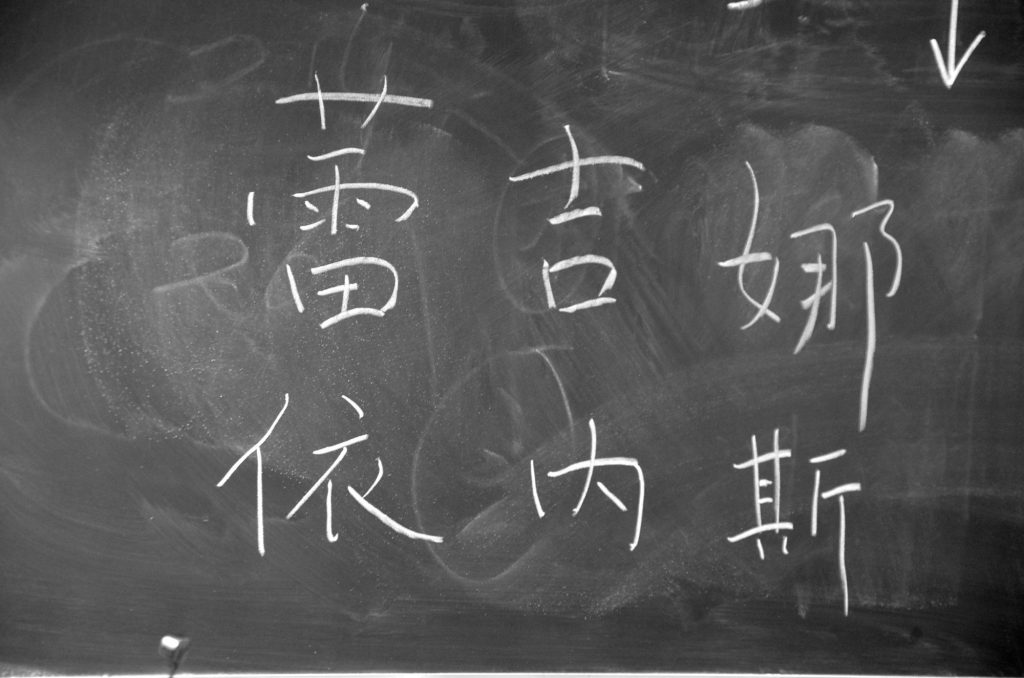
<First line should read “Regine”, second line should read “Ines”. I am not so sure.>
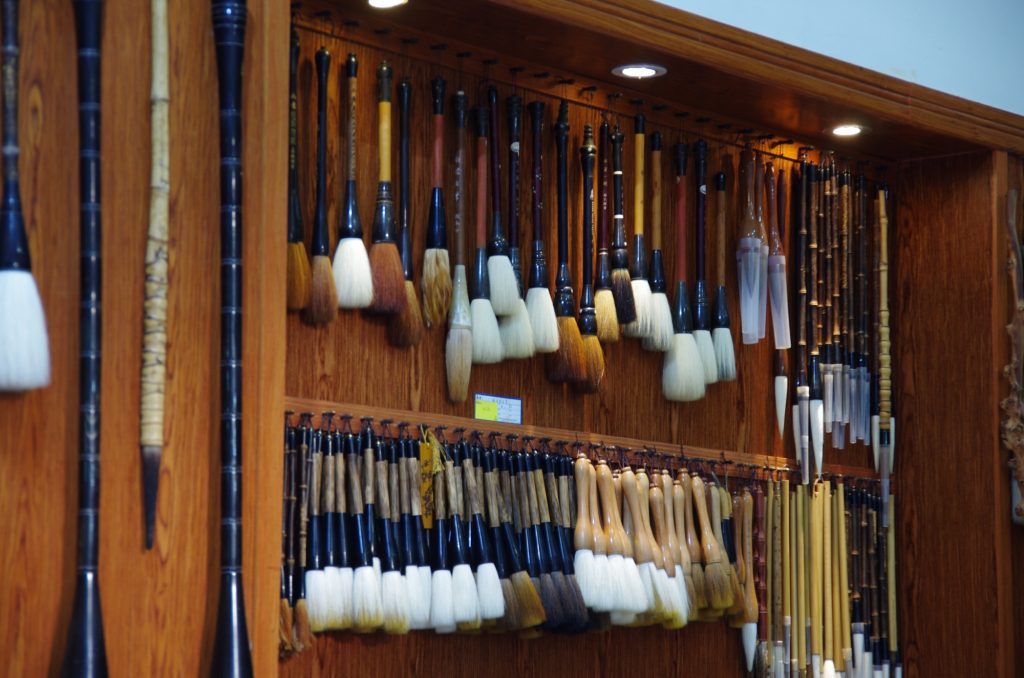
<If only I had any use for those wonderful brushes, I would have purchased a dozen.>
If you try to figure it out on your own, you might end up a pregnant emperor.
I was not happy with the outcome, though. Not only didn’t I like the sound, it also seemed to be too complicated. Hence I had an idea – I would come up with a synonym representing my name in some way. Lucky as I am, my name is derived from “queen” in Latin, and many times I have used this as a nickname if a person could not pronounce my real name (Hey, Washington, my lovely guide to Kilimanjaro, how are you, my dear?)
So I surfed the Internet for “queen” in Chinese, coming up with several options, which basically translated back to several versions of expressions that could be read as the emperor’s wife or sovereign or whatever some other mighty woman might call herself. But I wanted the real queen, so I settled at nŭ wáng (still no clue whether that is right, but it should translate to female king). To further verify my DIY name translation, I wrote the word into my notebook to show to my guide for translation of my handwriting the next day.
When he looked at my drawing, he scratched his head and translated to “pregnant”. I was puzzled, and then I learned that writing both parts of the word into a narrow space (i.e. one square area) means pregnant. If you want it to represent queen, you have to write it into a wide space, occupying two squares.
I really need to rethink my plan to craft a statement necklace in sterling silver as I originally intended. I might end up with a shiny pregnancy sign dangling around my neck – this is a message I really don’t want to send.
<So, that is self explanatory, it means 女王.>
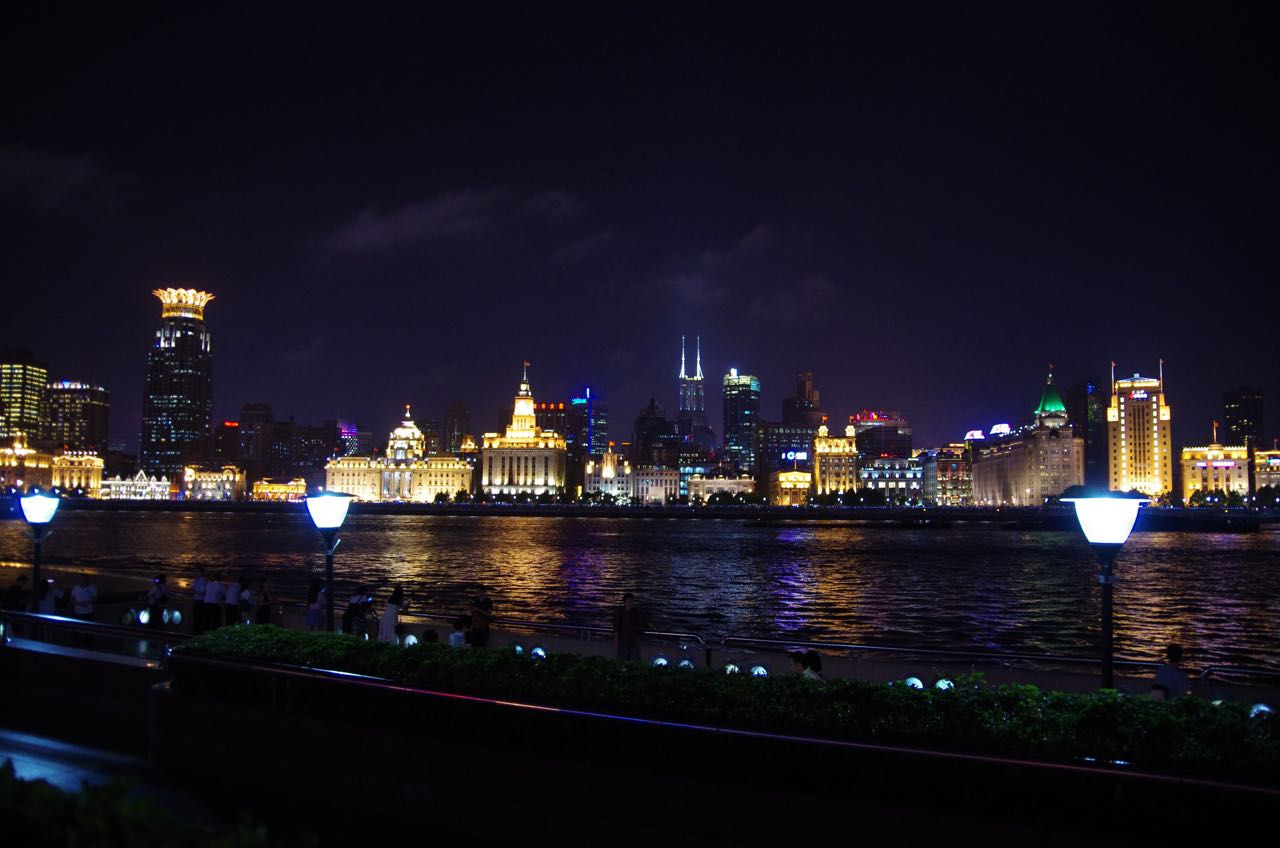
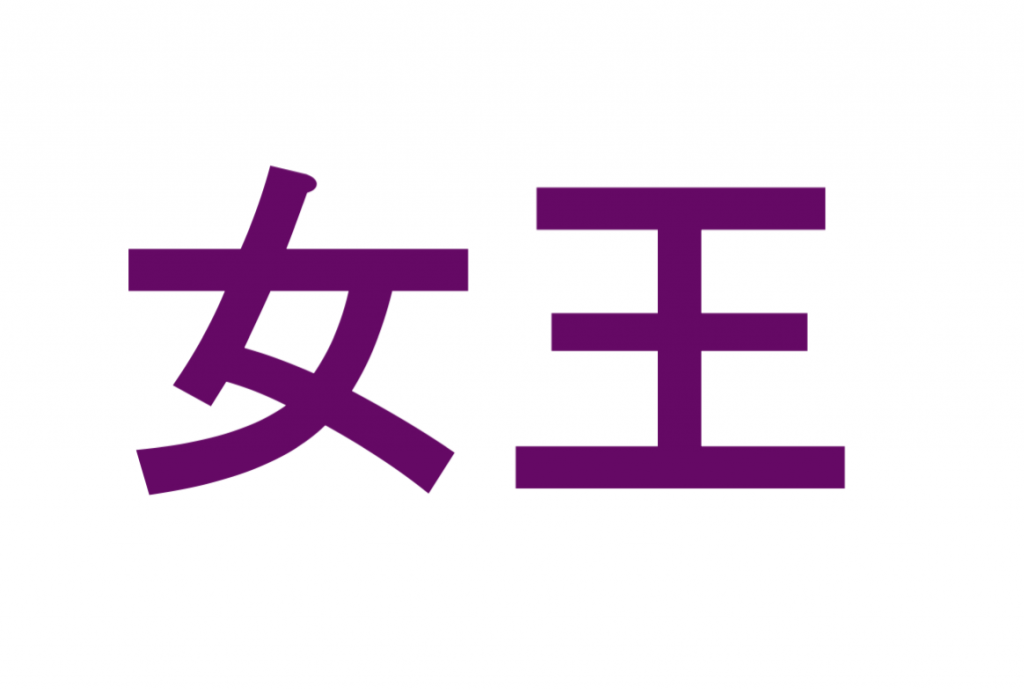
December 14, 2022 at 6:06 pm
Meine Liebe, ich lese jetzt seit 90 % und bin nun auf 23 % Batterie Leistung runter, deine Beiträge sind sooo gut, dass ich mir wünsche, dass du sie alle in Büchern festhalten solltest, die kann ich dann wenigstens in Ruhe ohne Batterieverfall genießen!
December 15, 2022 at 12:18 am
🙂 Freut mich.